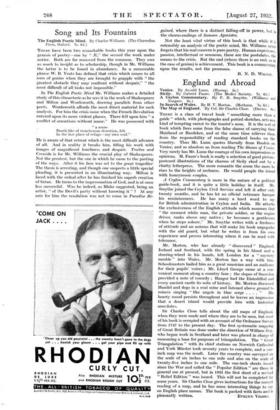Song and Its Fountains THERE have been two remarkable books
this year upon the genesis of poetry—one by " iE," the second the work under
notice. Both are far removed from the common. They owe as much to insight as to scholarship, though in Mr. Williams the latter is to be found in abundance. In a memorable phrase W. B. Yeats has defined that crisis which comes to all men of genius when they are brought to grapple with " the greatest obstacle they may confront without despair," " the most difficult of all tasks not impossible."
,In The English Poetic Mind Mr. Williams makes a detailed
study of this climacteric as he sees it in the work of Shakespeare and Milton and Wordsworth, drawing parallels from other poets. Wordsworth affords the most direct material for such analysis. For him the crisis came when the French Revolution entered upon its more violent phases. There fell upon him " a conflict of sensations without name." He was possessed with " a sense Death-like of treacherous desertion, felt In the last place of refuge—my own soul."
He is aware of that retreat which is the most difficult advance of all. And in reality it breaks him, filling his work with images of magnificent loneliness and despair. Troilus and Cressida is for Mr. Williams the crucial play of Shakespeare. Not the greatest, but the one in which he came to the parting of the ways. After it his face was set to the great tragedies. The thesis is arresting, and though one suspects a little special pleading, it is presented in an illuminating way. Milton is faced with the ordeal after he has finished his superb creation of Satan. He turns to the impersonation of God, and is at once less successful. Was he indeed, as Blake suggested, being an artist, " of the Devil's party without knowing it " ? At any rate for him the resolution was not to come in Paradise Re- gained, where there is a distinct falling-off in power, but in the chorus-endings of Samson Agonistes.
Not the least vital virtue of this book is that while it is ostensibly an analysis of the poetic mind, Mr. Williams never forgets that his real concern is pure poetry. Human experience, passion, intellectual or sensuous, these are the postulates, the means to the crisis. But the end (where there is an end, as in the case of genius) is achievement. This book is a commentary upon the results, not the processes.
R. N. D. WILSON,


























 Previous page
Previous page